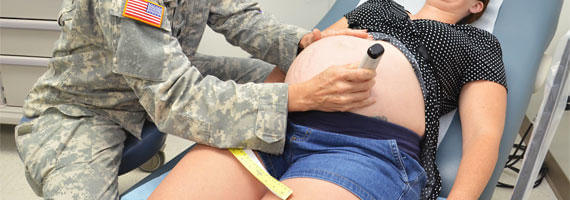I ran into my first military surrogate mother five years ago in the commissary. The wife of one of the junior sailors on our ship was hugely, glowingly, gloriously pregnant. I congratulated her.
“Oh, no,” she said. “This isn’t our baby. I’m carrying it for a couple in San Jose.”
This young wife explained how she was helping a couple become a family. How pregnancy was so easy for her. How getting paid for surrogacy let her stay home with her other two kids.
I kinda raised my eyebrows at the whole thing. But I figured that sometimes people do really selfless things -- strangers have donated kidneys to people they had never laid eyes on. This wife must have her reasons, her motivations, her callings.
Now I am wondering if she had her vulnerabilities, too. Last week Pulitzer Prize winning Washington Post columnist Kathleen Parker wrote about “the dark underbelly to the surrogacy industry.”
While Parker had no real beef with people who were desperate to become parents, she raised concerns about the brokers who provide potential surrogates as “a burgeoning industry that preys on vulnerable women, commodifying them as ‘ovens.’”
Then Parker noted:
"Surrogacy brokers are wise to their marketplace and specifically target populations that are likely to be attracted to surrogacy. Almost half the surrogates in this country are military wives, according to Kathleen Sloan, a National Organization for Women board member and surrogacy opponent."
Half of all surrogates are military wives? I question the accuracy of that statistic. Since surrogacy is only legal in 12 states, there aren’t any really solid statistics about surrogacy in the United States. Estimates circulate that there are somewhere between 1,200 – 1,400 surrogate births each year.
In past articles about military wives and surrogacy, surrogate agencies noted that 15 percent of surrogates were military spouses. Such a large jump would be a notable trend in our community. I wanted to know where that statistic comes from.
Edit: Sloan said she got found the statistic in this 2008 Newsweek story. That story puts a caveat on the "fact," saying that "IVF clinics and surrogate agencies in Texas and California say military spouses make up 50 percent of their carriers." So the statistic, which Newsweek also does not back-up with any sourcing whatsoever, is from a sampling of clinics and agencies in only two states, both of which have some of the largest military populations in the country.
Using a sampling of some clinics in two states with larger-than-normal military populations to make a blanket statistic statement is poor math. To assume that it's an accurate representation of all surrogates in the US is a huge leap in logic.
(This post originally said that Sloan could not be reached for comment. She contacted us May 29, after this story went live).
Kathleen Parker, the author of the column, also did not return requests for comment.
What saddens me about this piece is the way Parker and Sloan used military spouses as their example of the kind of people who become surrogates.
They didn’t point to military wives because we are more altruistic than other people. They didn’t point to military wives as a population that handles pregnancy better than other people.
They were saying that we military spouses are a vulnerable population. An exploitable population. A powerless population easily taken advantage of by those willing to profit on youth, low income, and a nomadic life.
When I took a look at some of the agencies that target military spouses, their arguments to become a surrogate were framed in a way designed to hit on all the vulnerabilities of young spouses.
The agencies promise that you become a member of a community so you feel less alone. They suggest you could use the money you earn as a surrogate to buy a house or pay for your child’s education. They swear they aren’t one of those agencies that rip off surrogate moms.
They don’t mention that surrogacy costs the potential parents between $80,000 - $100,000. That the surrogate’s fee is about $25,000. That the agency makes a good $15,000 to $18,000 per birth.
They don’t say that this is a business arrangement. They forget to mention that the only organ they care about in this transaction is not your heart.
I keep thinking about that young sailor’s wife aglow with pregnancy. I hope it all went well for her. I hope the baby she carried is now a Kindergartner with lovely parents and a story of the dear woman who carried her to term. I hope that the sailor's wife never had any hard feelings or cause to worry or wonder or regret.
That’s what I hope.










